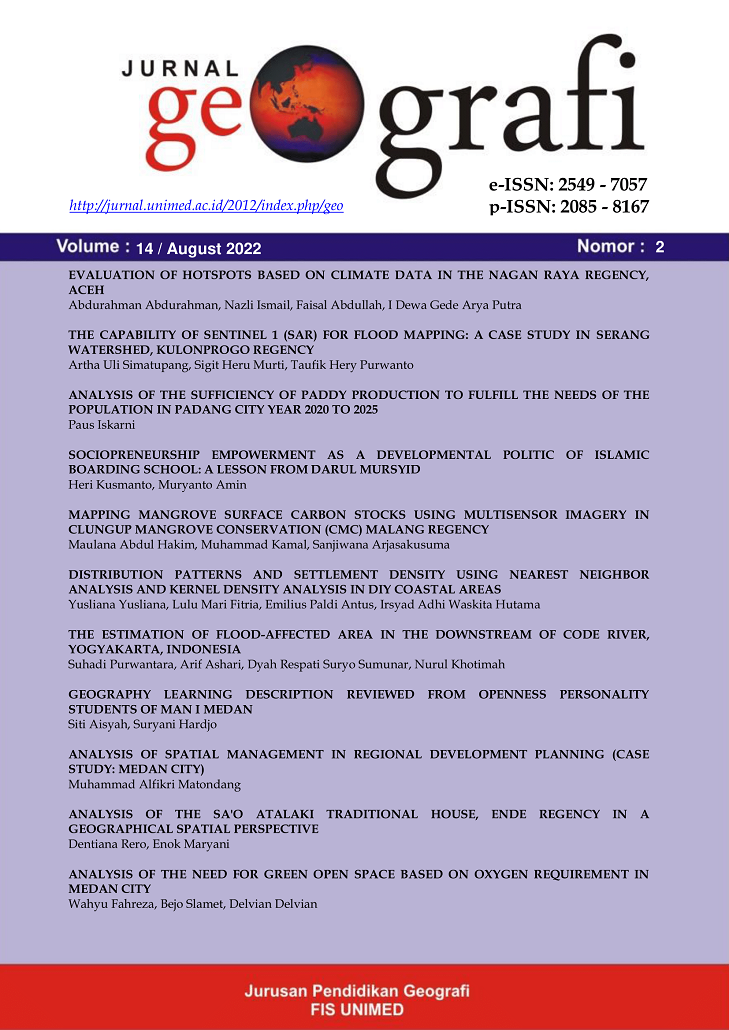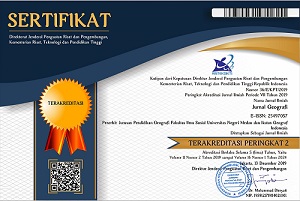THE CAPABILITY OF SENTINEL 1 (SAR) FOR FLOOD MAPPING: A CASE STUDY IN SERANG WATERSHED, KULONPROGO REGENCY
DOI:
https://doi.org/10.24114/jg.v14i2.32213Abstract
Floods are the most common natural disaster in Indonesia, with high intensity than any other natural disaster. A flood is a condition where an area is inundated due to an overflow of water that exceeds the water disposal capacity in a room, resulting in physical, social, and economic losses. The Serang watershed (DAS) belongs in the Priority I (critical) watershed condition, so it is necessary to determine flood-prone areas in future management. Sentinel 1 Remote Sensing Image (SAR) can record at any time, day or night, and in all weather conditions, making it suitable for flood analysis. This study aimed to determine the ability of Sentinel 1 Image (SAR) in determining the inundation flood area in Serang watershed, Kulonprogo Regency, Indonesia. The method used was the Otsu algorithm with threshold determination by measuring and evaluating the variance between classes of a threshold at a certain level calculated from the normalized histogram of the image. Floods in the Serang watershed, Kulonprogo Regency, mainly occur in agricultural areas. The ability of Sentinel images to obtain land surface data in all conditions can be used for flood analysis where passive sensor images cannot record it. In addition, the withdrawal of inundation areas on Sentinel 1 imagery using the Otsu algorithm can determine a threshold to separate inundated and unflooded areas with a confusion matrix of 77%.Keywords: Flood, Sentinel 1 (SAR), Otsu AlgorithmReferences
Amitrano, D., Di Martino, G., Iodice, A., Riccio, D., & Ruello, G. (2018). Unsupervised Rapid Flood Mapping Using Sentinel-1 GRD SAR Images. IEEE Transactions on Geoscience and Remote Sensing, 56(6), 3290“3299. https://doi.org/10.1109/TGRS.2018.2797536
Anusha, N., & Bharathi, B. (2020). Flood detection and flood mapping using multi-temporal synthetic aperture radar and optical data. Egyptian Journal of Remote Sensing and Space Science, 23(2), 207“219. https://doi.org/10.1016/j.ejrs.2019.01.001
Arief, M., Anggraini, N., Adawiah, S. W., Hartuti, M., & Suwargana, N. (2017). Aplikasi Data Satelit Radar Sentinel-1A Guna Deteksi Hutan Mangrove Studi Kasus : Segara Anakan , Kabupaten Cilacap. Seminar Nasional Penginderaan Jauh Ke-4 Tahun 2017, 1982, 277“289.
Armenakis, C., Du, E. X., Natesan, S., Persad, R. A., & Zhang, Y. (2017). Flood risk assessment in urban areas based on spatial analytics and social factors. Geosciences (Switzerland), 7(4), 1“15. https://doi.org/10.3390/geosciences7040123
Asrul, & Simanungkalit, N. M. (2013). Penyebaran Daerah Rawan Banjir di Kelurahan Anggrung Kecamatan Medan Polonia Kota Medan. Jurnal Geografi, 5(1), 157“168.
Astuti, A. J. D., Nurwihastuti, D. W., & Triastuti, R. (2017). Analisis Koefisien Aliran Permukaan dengan Menggunakan Metode Bransby-Williams di Sub Daerah Aliran Sungai Babura Provinsi Sumatera Utara. Jurnal Geografi, 9(2), 158“165.
Bachri, S., Aldianto, Y. E., Sumarmi, U, K. S. B., & F, M. N. (2020). Flood Modelling of Badeng River Using Hec-Ras in Singojuruh Sub- District, Banyuwangi Regency, East Java, Indonesia. Jurnal Geografi, 13(1), 76“87. https://doi.org/10.24114/jg.v
Cao, C., Xu, P., Wang, Y., Chen, J., Zheng, L., & Niu, C. (2016). Flash flood hazard susceptibility mapping using frequency ratio and statistical index methods in coalmine subsidence areas. Sustainability (Switzerland), 8(9). https://doi.org/10.3390/su8090948
Cao, H., Zhang, H., Wang, C., & Zhang, B. (2019). Operational flood detection using Sentinel-1 SAR data over large areas. Water (Switzerland), 11(4), 1“21. https://doi.org/10.3390/w11040786
Clement, M. A., Kilsby, C. G., & Moore, P. (2018). Multi-temporal synthetic aperture radar flood mapping using change detection. Journal of Flood Risk Management, 11(2), 152“168. https://doi.org/10.1111/jfr3.12303
Congalton, R., & Green, K. (2008). Assessing the Accuracy of Remotely Sensed Data: Principles and Practices (Second Edition).
Darmawan, K., Hani™ah, & Suprayogi, A. (2017). Analisis Tingkat Kerawanan Banjir di Kabupaten Sampang Menggunakan Metode Overlay dengan Scoring Berbasis Sistem Informasi Geografis. Jurnal Geodesi Undip, 6, 31“40.
Du, Y., Zhang, Y., Ling, F., Wang, Q., Li, W., & Li, X. (2016). Water bodies™ mapping from Sentinel-2 imagery with Modified Normalized Difference Water Index at 10-m spatial resolution produced by sharpening the swir band. Remote Sensing, 8(4). https://doi.org/10.3390/rs8040354
Erena, S. H., & Worku, H. (2019). Urban flood vulnerability assessments: the case of Dire Dawa city, Ethiopia. Natural Hazards, 97(2), 495“516. https://doi.org/10.1007/s11069-019-03654-9
ESA. (2012). Sentinel 1- ESA™s radar observatory mission for GMES operational services. In ESA Special Publication (Vol. 1, Issue 1322). https://sentinel.esa.int/documents/247904/349449/S1_SP-1322_1.pdf
Jacinth Jennifer, J., Saravanan, S., & Abijith, D. (2020). Integration of SAR and multi-spectral imagery in flood inundation mapping“a case study on Kerala floods 2018. ISH Journal of Hydraulic Engineering, 00(00), 1“11. https://doi.org/10.1080/09715010.2020.1791265
Jahangir, M. H., Mousavi Reineh, S. M., & Abolghasemi, M. (2019). Spatial predication of flood zonation mapping in Kan River Basin, Iran, using artificial neural network algorithm. Weather and Climate Extremes, 25(July), 100215. https://doi.org/10.1016/j.wace.2019.100215
Khan, S. I., Hong, Y., Wang, J., Yilmaz, K. K., Gourley, J. J., Adler, R. F., Brakenridge, G. R., Policelli, F., Habib, S., & Irwin, D. (2011). Satellite remote sensing and hydrologic modeling for flood inundation mapping in lake victoria basin: Implications for hydrologic prediction in ungauged basins. IEEE Transactions on Geoscience and Remote Sensing, 49(1 PART 1), 85“95. https://doi.org/10.1109/TGRS.2010.2057513
Kordelas, G. A., Manakos, I., Aragonés, D., DÃaz-Delgado, R., & Bustamante, J. (2018). Fast and automatic data-driven thresholding for inundation mapping with Sentinel-2 data. Remote Sensing, 10(6), 1“23. https://doi.org/10.3390/rs10060910
Li, J., & Wang, S. (2015). An automatic method for mapping inland surface waterbodies with Radarsat-2 imagery. International Journal of Remote Sensing, 36(5), 1367“1384. https://doi.org/10.1080/01431161.2015.1009653
Maridi, Saputra, A., & Agustina, P. (2015). Kajian Potensi Vegetasi dalam Konservasi Air dan Tanah di Daerah Aliran Sungai ( DAS ): Studi Kasus di 3 Sub DAS Bengawan Solo ( Keduang , Dengkeng , dan Samin ). Prosiding Seminar Nasional Konservasi Dan Pemafaatan Sumber Daya Alam, 65“68.
Miardini, A., & Saragih, G. S. (2019). Penentuan Prioritas Penanganan Banjir Genangan Berdasarkan Tingkat Kerawanan Menggunakan Topographic Wetness Index Studi Kasus di Das Solo. Jurnal Ilmu Lingkungan, 17(1), 113. https://doi.org/10.14710/jil.17.1.113-119
N, T., & M, N. (2021). ALOS-2 and Sentinel-1 Backscattering Coefficients for Water and Flood Detection in Nakhon Phanom Province , Northeastern Thailand. 17(3), 39“48.
Qaiyim, A. (2018). Analisis Dampak Sosial Ekonomi Di Kabupaten Pamekasan (Studi Kasus Banjir, Longsor dan Kekeringan di Pamekasan 2007). Journal of Management and Accounting, 1(2), 153“168. https://media.neliti.com/media/publications/266500-analisis-dampak-sosial-ekonomi-pasca-ben-30a35ded.pdf
Rahman, M. R., & Thakur, P. K. (2018). Detecting, mapping and analysing of flood water propagation using synthetic aperture radar (SAR) satellite data and GIS: A case study from the Kendrapara District of Orissa State of India. Egyptian Journal of Remote Sensing and Space Science, 21, S37“S41. https://doi.org/10.1016/j.ejrs.2017.10.002
Saputra, A. K., Santoso, D. H., & Ade Yudono, A. R. (2020). Zonasi Tingkat Kerawanan Banjir Pada Ruas Bekas Sungai di Kabupaten Sukoharjo. Jurnal Geografi, 12(01), 255. https://doi.org/10.24114/jg.v12i01.14390
Setyaningsih, W., Sriyono, S., & Benardi, A. (2019). Kajian Kerusakan Lahan Di Daerah Aliran Sungai (Das) Kreo Akibat Pembangunan Pemukiman Di Sekitar Waduk Jatibarang Kota Semarang. Media Komunikasi Geografi, 19(2), 177. https://doi.org/10.23887/mkg.v19i2.16027
Setyo Pambudi, A. (2019). Watershed Management in Indonesia: A Regulation, Institution, and Policy Review. Jurnal Perencanaan Pembangunan: The Indonesian Journal of Development Planning, 3(2), 185“202. https://doi.org/10.36574/jpp.v3i2.74
Sghaier, M. O., Hammami, I., Foucher, S., & Lepage, R. (2018). Flood extent mapping from time-series SAR images based on texture analysis and data fusion. Remote Sensing, 10(2), 1“30. https://doi.org/10.3390/rs10020237
Shahabi, H., Shirzadi, A., Ghaderi, K., Omidvar, E., Al-Ansari, N., Clague, J. J., Geertsema, M., Khosravi, K., Amini, A., Bahrami, S., Rahmati, O., Habibi, K., Mohammadi, A., Nguyen, H., Melesse, A. M., Ahmad, B. Bin, & Ahmad, A. (2020). Flood detection and susceptibility mapping using Sentinel-1 remote sensing data and a machine learning approach: Hybrid intelligence of bagging ensemble based on K-Nearest Neighbor classifier. Remote Sensing, 12(2). https://doi.org/10.3390/rs12020266
Shen, X., Wang, D., Mao, K., Anagnostou, E., & Hong, Y. (2019). Inundation extent mapping by synthetic aperture radar: A review. Remote Sensing, 11(7), 1“17. https://doi.org/10.3390/RS11070879
Simarmata, N., Nadzir, Z. A., & Agustina, L. K. (2022). Application of Spot6/7 Satellite Imagery for Rice Field Mapping Based on Transformative Vegetation Indices. Jurnal Geografi, 14(1), 69. https://doi.org/10.24114/jg.v14i1.29036
Tiwari, V., Kumar, V., Matin, M. A., Thapa, A., Ellenburg, W. L., Gupta, N., & Thapa, S. (2020). Flood inundation mapping-Kerala 2018; Harnessing the power of SAR, automatic threshold detection method and Google Earth Engine. PLoS ONE, 15(8 August), 1“17. https://doi.org/10.1371/journal.pone.0237324
Uddin, K., Matin, M. A., & Meyer, F. J. (2019). Operational flood mapping using multi-temporal Sentinel-1 SAR images: A case study from Bangladesh. Remote Sensing, 11(13). https://doi.org/10.3390/rs11131581
Wakabayashi, H., Motohashi, K., Kitagami, T., Tjahjono, B., Dewayani, S., Hidayat, D., & Hongo, C. (2019). Flooded area extraction of rice paddy field in Indonesia using sentinel-1 SAR data. International Archives of the Photogrammetry, Remote Sensing and Spatial Information Sciences - ISPRS Archives, 42(3/W7), 73“76. https://doi.org/10.5194/isprs-archives-XLII-3-W7-73-2019
Yunida, R., Kumalawati, R., & Arisanty, D. (2017). Dampak Bencana Banjir Terhadap Kondisi Sosial Ekonomi Masyarakat Di Kecamatan Batu Benawa Kabupaten Hulu Sungai Tengah, Kalimantan Selatan. Jurnal Pendidikan Geografi, 4(4), 42“52.
























